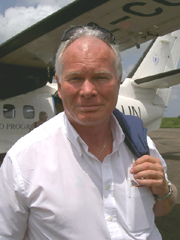BUNIA, 12 March 2008 (IRIN) - The international community has released US$7 million as a first tranche of aid this year to stabilise the troubled district of Ituri in the northeast of the Democratic Republic of Congo (DRC), Ross Mountain, UN resident coordinator and special representative of the UN Secretary-General in the country, said. 
IRIN
"We have given every possibility to militia members to lay down their weapons. But there are still some elements - few in number - who are preventing citizens in one part of the district from taking advantage of the brilliant future which could lie ahead for this part of the country. Work to bring about stability will go on. I am confident that stability will be achieved," said Mountain.
The funds will be used to improve food security and the rehabilitation of health, and water and sanitation facilities, with a view to making conditions conducive for the return of displaced people to their places of origin, he said.
Some 115,000 people are still displaced in Ituri, which means there has been a massive return of the population to their original communities since 2003 when the UN Office for the Coordination of Humanitarian Affairs (OCHA) estimated that more than 800,000 people were displaced.
"It's still a lot [of people]," Mountain said.
Bunia consultative forum
To draw up a plan of action aimed at stabilisation and community rehabilitation in Ituri, the UN Development Programme (UNDP) has been organising, since 10 March, a consultative forum in Bunia, bringing together about 100 representatives of stakeholders in Ituri.
Participants include representatives of the political and administrative authorities in the district, state technical service providers, the UN, national and international NGOs, civil society and aid donors.
A UNDP press release on 10 March stated that one of the key objectives of this forum was to promote a better understanding of the security, political and community stabilisation stakes in Ituri. It would also rely on reference works for the rehabilitation of Ituri set out by the different UN agencies, while supporting local government, in order to reach a consensus on priority actions.
"The international community has done everything it could to impose peace. UN soldiers have paid with their blood for this peace; their wives have become widows, their children orphans. We have killed them because of our stupidity and disagreements. I believe this is the moment to say more than ever 'end the war',? said Medard Autsai Asenga, governor of Orientale Province, where Ituri is situated.
At least 60,000 civilians were killed in attacks and revenge-attacks in Ituri between rival ethnic groups in 1999-2003, according to the UN.
The government has disarmed and demobilised 25,000 militia members, and 11,000 children associated with these armed forces and groups have been able to rejoin their families, according to humanitarian agencies.
"Ituri is on the right track, it must be said. It should be like that because this district has enormous agricultural wealth, gold, timber, minerals, oil, and human skills, which are available for the reconstruction of this country. This could well be a model conflict zone in the east," said Mountain.
rp/cb/jn/mw
Related articles
- • UN Security Council Calls on Rwanda to Stop Supporting M23 Rebels in DR Congo (February 22, 2025)
- • 'Deadly environment' plus 'political and social' obstacles hinder Ebola fight, Security Council hears (July 24, 2019)
- • Ebola outbreak declared an international Public Health Emergency (July 17, 2019)
- • At least 30 dead after massacres in Ituri (March 2, 2018)
- • ICC Confirms 14-Year Sentence Against Thomas Lubanga (December 1, 2014)
- • ICC sentences Germain Katanga to 12 years (May 23, 2014)
- • ICC finds Germain Katanga guilty of war crimes and crime against humanity (March 7, 2014)
- • Bosco Ntaganda Attacked Civilians on Ethnic Grounds, ICC Prosecutor Says (February 10, 2014)
- • Rebel Leader Bosco Ntaganda Makes First Appearence Before the ICC (March 26, 2013)
- • Bosco Ntaganda in the International Criminal Court's custody (March 22, 2013)
- • International Criminal Court Acquits Mathieu Ngudjolo Chui (December 18, 2012)
- • ICC Prosecutor Seeks 30 Years for Thomas Lubanga (June 13, 2012)
- • ICC Prosecutor Seeks New Charges Against Ntaganda, FDLR Leader (May 14, 2012)
- • Kabila's Position on The Arrest of Ntaganda 'Has Not Changed' (April 13, 2012)
- • DR Congo Government Warns Bosco Ntaganda He May Face Justice (April 6, 2012)
- • Thomas Lubanga found guilty of using child soldiers (March 14, 2012)
- • Militiamen Sent to Testify in Warlords Trials at ICC (March 28, 2011)
- • Thomas Lubanga trial to resume at ICC (October 8, 2010)
- • ICC suspends release of Thomas Lubanga (July 23, 2010)
- • ICC orders the release of Thomas Lubanga (July 15, 2010)
- • ICC suspends Thomas Lubanga trial (July 8, 2010)
- • Lubanga Witness Says He Was Paid US$200 To Tell Lies (February 8, 2010)
- • UN Security Council renews arms embargo and sanctions in DR Congo (November 30, 2009)
- • Activists say UN policy must change in DR Congo (November 25, 2009)
- • ICC: Germain Katanga and Mathieu Ngudjolo Chui trial starts on Tuesday (November 23, 2009)
- • UN mission in DR Congo denies Ntanganda's role in military operation (September 10, 2009)
- • First Elements of Additional Troops to Reinforce MONUC Arrive in DRC (August 27, 2009)
- • Senior UN peacekeeping official assesses DR Congo's prisons (July 22, 2009)
- • Witness Claims Lubanga Visited Training Camp (June 5, 2009)
- • UN complains of Congo troop delay (April 8, 2009)
Tags: | • Ituri |







